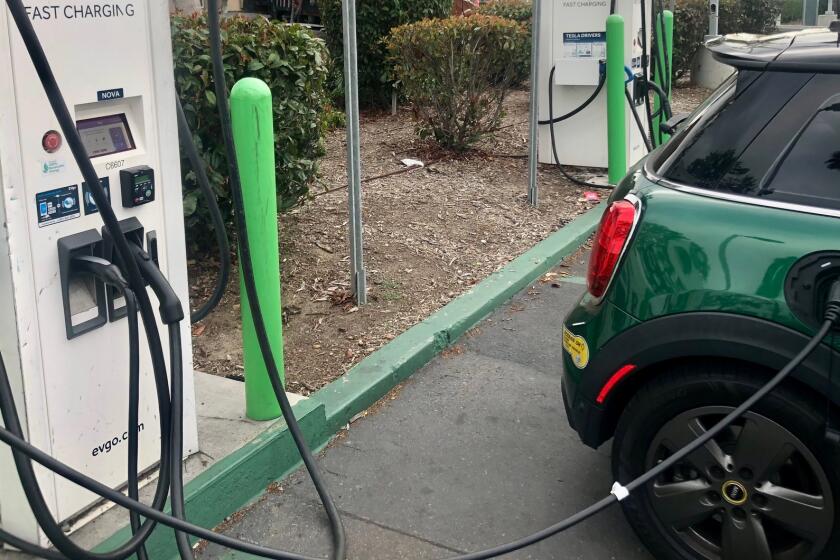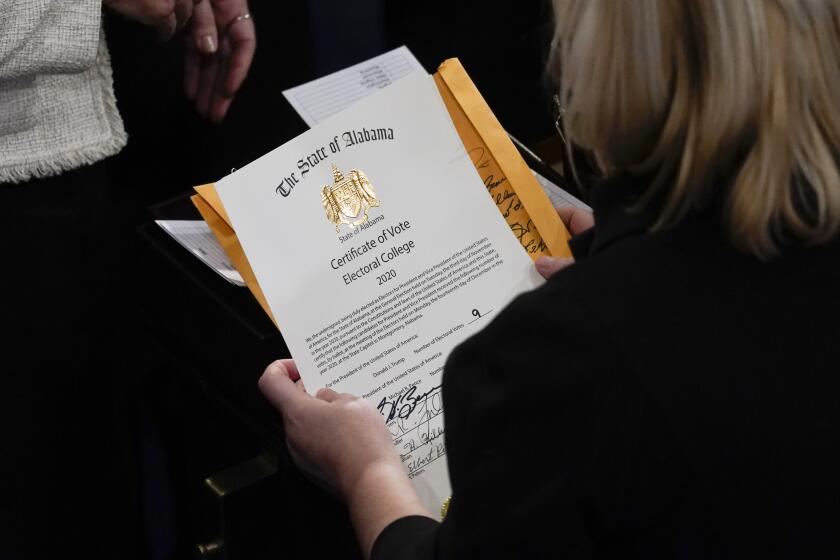Michael Jackson on our pages
The king of pop attracted the editorial boards criticism, sympathy and praise.
Posted July 3, 2009
Michael Jackson lived his life so erratically that there never was a common thread to the occasions when The Times' editorial board would focus on the king of pop. These editorials, however, do reflect what in retrospect the tragedy what was Jackson's life: In 1993, The Times praised the artist for his charity work, but by 2005, the editorial board all but declared his musical career over.
The editorials that follow are arranged in reverse chronological order.
June 14, 2005
The Trial of a Career
For the first time in almost two years, Michael Jackson will wake up this morning without the shadow of possible imprisonment hanging over him. Acquitted on all charges of child molestation, he should be facing the future with a song in his heart and a new CD up his sleeve.
Yet while the verdict was a humiliation for the Santa Barbara County district attorney, Tom Sneddon, he may live to see Jackson's downfall after all. Although he did not sway the jurors, his prosecution cast such a damning light on Jackson's unsavory lifestyle that the former king of pop's career is in danger.
It is not news that Jackson is weird; his bizarre behavior has been long and widely reported. His experimentation with skin pigmentation to turn white; his frequent nose surgeries; his close friendships with young boys; his dangling his son out of a hotel window -- all have been featured in serious newspapers and magazines as well as those sold at supermarket checkout stands.
But in court there was evidence not only of Jackson's weirdness but of an unpalatable taste for the tawdry. The jury saw police videos of Jackson's bathtub, his outdoor Jacuzzi and a black briefcase stuffed with adult magazines that he kept in his bedroom. Jurors saw a desk in his office cluttered with bare-breasted dolls in sadomasochistic gear. There also was testimony that Jackson often was intoxicated in the presence of children.
Jackson also is facing financial ruin. If his career survives, he will have to severely curtail his spending while selling billions more records and selling out concerts well into old age to pay off the huge debts he has accumulated -- not even counting his legal fees, which are surely substantial.
The trial revealed that he has been financing his lavish lifestyle with borrowed money. Witnesses testified that in 2003 he was $270 million in debt, was spending twice or three times his yearly income of $10 million and was being dunned by creditors.
If Jackson defaults on his loans when they come due in December, he could be forced to sell his most valuable asset: his 50% ownership of the catalog of publishing rights to 251 songs by the Beatles, plus songs by Bob Dylan, Willie Nelson, Little Richard and others. He may even have to sell his beloved Neverland ranch.
Yet his finances may actually be in better shape than his reputation. After this trial, not even an acquittal may be enough to save Jackson's career.
February 12, 2003
Get an Adult on the Case
Something is out of kilter when a father best known for biting the head off a bat is ahead of child welfare agencies in saying that someone ought to look into a 44-year-old naif who publicly professes a fondness for sleeping with children. The media frenzy over Michael Jackson was embarrassing even before Ozzy Osbourne weighed in on television Monday. The sad silliness does raise a serious question, however, about our culture's grasp of the term "responsible adult behavior."
We live at a time when soccer coaches undergo background checks and teachers know better than to go anywhere alone with a child, let alone offer hugs of encouragement. So why aren't social workers storming the gates of Neverland, the Santa Ynez Valley compound owned by the multimillionaire superstar, who has in recent months dangled his baby off a balcony and admitted to wrapping a newborn in a towel and whisking her home before nurses had a chance to clean her?
The TV special everyone is still talking about, "Living With Michael Jackson," portrayed him as a gentle, creative spirit, despite his tacky taste in expensive tchotchkes. But the childlike charm of a middle-aged man who climbs a favorite tree fades when he defiantly admits he has shared his bed with "many children."
Jackson denies any molestation, says the kids always ask first to sleep in his bed, that he's simply tucking them in, giving them story time and showing them love and that he always gets the permission of their parents first.
Even taken at face value, his remarks reveal an alarming absence of prudence, especially considering that a decade ago a 13-year-old boy accused him of molestation. Jackson sees that lack of standard adult judgment as part of his childlike, creative nature. Fine, but not if he wants to be responsible for children. A sense of limits is what separates adults from kids.
Who knows what goes on at Jackson's after iffy parents drop off their kids? This TV special, heavy on innuendo and light on candor by Jackson, never makes that clear. What is clear
is that Santa Barbara County's child welfare authorities need to fulfill society's adult responsibilities and scrutinize Jackson. They need to make sure that he is in no way harming the true innocents in this ongoing story -- his own children and vulnerable visitors three or more decades younger than their soft-spoken host.
At the very least, social workers could teach him the proper method for cradling a baby's head during bottle-feeding and better ways to protect children from paparazzi than insisting they wear masks. Maybe they can bring the Osbournes along as models of relatively responsible parenting.
August 28, 1993
Presumed Innocent
The beauty of the American system of justice is that, at least in theory, it is supposed to work for the rich as well as the poor.
Yes, we realize that this is a rather unusual turn on the usual phrase, but it does bear asserting: Just because you are rich and can afford the best legal talent money can buy doesn't mean you are not entitled to the U.S. justice system's presumption of innocence until proven guilty.
Entertainer Michael Jackson is under a cloud of serious allegations right now. But they are only allegations and they are not proven. Indeed, nothing has even been officially charged.
And nothing may ever be officially charged. The ultimate truth may turn out to be that there is no truth to any of these charges.
The American system of justice is based on the requirement of proof before conviction.
A good thing, too: Recent case history in America regarding allegations of sexual molestation of minors is replete with examples of charges that eventually were shown to be false or were unproven.
Furthermore, without conviction in a court of law, the American system insists on complete exculpability. If no charges are proven, there can be no guilt.
Even a multimillionaire deserves to be judged by no less fair a standard. Indeed, if we fail to insist on that, we allow an individual's career and future to be driven into the ground by nothing more than unofficial charges and rumors.
And that would be a sad day for America--whether you're rich or poor, famous nor not.
January 28, 1993
Aid Thriller
Children are hurting in Los Angeles' inner city. About a third of the boys and girls there grow up poor. Too many preschoolers have not had immunizations. All these youngsters need help, and one of their idols, Michael Jackson, plans to do his bit.
The black pop singer has announced a $1.5-million initiative through his Heal the World Foundation to make life just a little better for thousands of inner-city children who live in South Los Angeles, East Los Angeles and the Pico-Union neighborhood.
Jimmy Carter will co-chair this admirable new effort, raise additional funds and set up programs in other cities. Carter's participation gives the Jackson announcement credibility because of the former President's past work to alleviate poverty and homelessness.
Heal LA is expected to work with existing agencies and social services to provide drug education for more than 70,000 children, immunize 15,000 and find mentors for 3,000. These efforts will be phased in by April 29, the anniversary of the Los Angeles riots.
Jackson is contributing start-up funds; his foundation hopes to raise a bundle. So far, Heal LA has collected $750,000 in donations and matching grants. Much more is needed because of cutbacks in government programs and private charities.
Jackson will spotlight the needs of disadvantaged children during his half-time performance at Sunday's Super Bowl. Perhaps he will inspire more Americans to share their wealth, their talents and their time to help poor children.
A cure for the common opinion
Get thought-provoking perspectives with our weekly newsletter.
You may occasionally receive promotional content from the Los Angeles Times.







